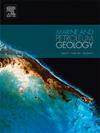Do red marine carbonates represent oxic environments? New understanding from the Upper Ordovician marine limestone in Tarim Basin, China
IF 3.7
2区 地球科学
Q1 GEOSCIENCES, MULTIDISCIPLINARY
引用次数: 0
Abstract
Marine red beds (MRBs), typically colored by Fe- and Mn-rich minerals, are often interpreted as indicators of bottom water oxygenation. However, their continuous formation requires long-term input of aqueous derived Fe-Mn oxides and/or stable sources of Fe2+ and Mn2+ ions, challenging the traditional concept of “red equals oxic environment.” This study investigates two coeval Upper Ordovician Sandbian MRB carbonate intervals in the Tarim Basin. Previous studies attributed the pigment origin to hematite. Th/U values and total rare earth element and yttrium (REY) contents increased in the MRB interval, indicating a terrestrial source of iron. Hematite was observed within the intercrystal pores of calcite precipitating from porewater, consistent with high Nicarb abundance and MREE-enriched bulge pattern in the red intervals. Both sections exhibit high Fecarb and Mncarb, pointing to substantial reductive dissolution of Fe and Mn oxides. Simulation shows that isotopic discrimination (Δ13C) between carbonate and organic carbon could be biased by increasing benthic Fe-Mn flux, leading to decreased Δ13C values in MRB intervals. Ce/Ce∗ values in the high-Mncarb interval reflect the releasing of Ce by reductive dissolution of Mn oxides. The commonly used carbonate-based redox proxy I/(Ca + Mg) ratio is correlated positively with Mncarb in the shallower section and with TOC in the deeper section, while it is negatively correlated with TOC in the shallower horizon, suggesting that iodine behavior may be influenced by adsorption and releasing of Mn hydro-oxides and organic matter besides oxygen contents. This study links MRB coloring to Fe and Mn mineral cycling in pore water through reductive dissolution and oxidative precipitation, and highlights potential biases of carbonate-based redox proxies that might be susceptible to other electron acceptors/donors such as Fe-Mn oxides and organic matter, in addition to free oxygen in seawater.

红色海相碳酸盐岩代表缺氧环境吗?中国塔里木盆地上奥陶统海相石灰岩的新认识
海洋红床(MRBs)通常由富含铁和锰的矿物着色,通常被解释为底层水含氧量的指标。然而,它们的持续形成需要水生铁锰氧化物和/或稳定的 Fe2+ 和 Mn2+ 离子源的长期输入,这就对 "红色等于缺氧环境 "的传统概念提出了挑战。本研究调查了塔里木盆地两个共生的上奥陶统砂岩MRB碳酸盐岩段。以前的研究认为色素来源于赤铁矿。MRB区间的Th/U值以及稀土元素和钇(REY)总含量增加,表明铁元素来源于陆地。在孔隙水析出的方解石晶间孔隙中观察到赤铁矿,这与红色区间的高尼卡布丰度和 MREE 富集隆起模式相一致。两个断面都显示出较高的 Fecarb 和 Mncarb,表明铁和锰氧化物的大量还原溶解。模拟结果表明,碳酸盐和有机碳之间的同位素分辨(Δ13C)可能会因底栖铁锰通量的增加而发生偏移,从而导致 MRB 区段的Δ13C 值下降。高锰碳区间的 Ce/Ce∗ 值反映了锰氧化物还原溶解释放出的 Ce。常用的基于碳酸盐的氧化还原代用指标 I/(Ca + Mg)比值在较浅层段与 Mncarb 呈正相关,在较深层段与总有机碳呈负相关,而在较浅层段则与总有机碳呈负相关,这表明除了氧含量之外,碘的行为还可能受到 Mn 水氧化物和有机质的吸附和释放的影响。这项研究通过还原溶解和氧化沉淀将 MRB 色度与孔隙水中的铁和锰矿物循环联系起来,并强调了以碳酸盐为基础的氧化还原代用指标的潜在偏差,除了海水中的游离氧之外,这些代用指标还可能受到其他电子受体/供体(如铁锰氧化物和有机物)的影响。
本文章由计算机程序翻译,如有差异,请以英文原文为准。
求助全文
约1分钟内获得全文
求助全文
来源期刊

Marine and Petroleum Geology
地学-地球科学综合
CiteScore
8.80
自引率
14.30%
发文量
475
审稿时长
63 days
期刊介绍:
Marine and Petroleum Geology is the pre-eminent international forum for the exchange of multidisciplinary concepts, interpretations and techniques for all concerned with marine and petroleum geology in industry, government and academia. Rapid bimonthly publication allows early communications of papers or short communications to the geoscience community.
Marine and Petroleum Geology is essential reading for geologists, geophysicists and explorationists in industry, government and academia working in the following areas: marine geology; basin analysis and evaluation; organic geochemistry; reserve/resource estimation; seismic stratigraphy; thermal models of basic evolution; sedimentary geology; continental margins; geophysical interpretation; structural geology/tectonics; formation evaluation techniques; well logging.
 求助内容:
求助内容: 应助结果提醒方式:
应助结果提醒方式:


